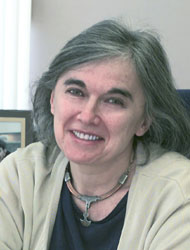 |

Friday Evening Lecture Series
 |
|
|
|
07/28/06
Glassman Lecture
"Gene, Interrupted: Introns and Inteins in Evolution, Biotechnology, and Medicine"
Marlene Belfort, Wadsworth Center, New York State Department of Health
Lecture Abstract:
Genes are typically interrupted by stretches of DNA called intervening sequences that are critically important to the dynamic nature of genomes. These genetic interruptions come in two basic forms, depending on when and how they are removed from the gene, so that the gene can be expressed in coherent form in the cell. These different intervening sequences are called introns and inteins. Their myriad fascinating properties are the subject of study in my laboratory. Not only do introns and inteins provide clues about the plasticity of genomes, and how they evolved, but also they have properties that make them extremely useful to researchers, biotechnologists, and biomedical scientists. I will describe how inteins are being used to separate important compounds for the pharmaceutical industry. I will also describe how introns are being adapted to target DNA for gene therapy. Thus, introns and inteins provide wonderful examples of how fundamental work on DNA, RNA and proteins, which encode or constitute introns and inteins, are leading to refined theories of evolution on the one hand, and the development of laboratory tools and health-care reagents on the other. This relationship is embodied in the words of Robert Oppenheimer (1904-1967) "It is a profound and necessary truth that the deep things in science are not found because they are useful; they are found because it was possible to find them".
Dr. Marlene Belfort is Distinguished Professor of Molecular Genetics, Biomedical Sciences, School of Public Health, SUNY Albany, NY and Director of the Division of Genetic Disorders at the Wadsworth Center, New York State Department of Health. She is an adjunct professor in the Departments of Biology (SUNY) and both Biology and Chemical Engineering at Rensselaer Polytechnic Institute (RPI). After graduating with a B.S. degree from the University of Cape Town, South Africa, Dr. Belfort received her Ph.D. degree in molecular biology at the University of California at Irvine, and performed post-doctoral work at the Hebrew University-Hadassah Medical School, Jerusalem, Israel, where she holds an honorary doctorate. Dr. Belfort chaired the NIH Microbial Genetics study section, served on the board of directors of the RNA Society and currently serves on the Board of Advisors of the Canadian Institute for Advanced Research, Evolutionary Biology Program. She has also organized international meetings in nucleic acid dynamics and evolution for the Keystone Conferences, FASEB and Gordon Research Conferences. Dr. Belfort has served on the editorial board of Gene, Methods in Molecular and Cellular Biology, RNA, Nucleic Acids Research, Journal of Molecular Biology and Journal of Bacteriology. Dr. Belfort is a member of the National Academy of Sciences and a fellow of both the American Academy of Arts and Sciences and the American Academy of Microbiology. Her research interests are in splicing, mobility and evolution of self-splicing introns, and their application to biotechnology. Her research is funded by two NIH grants (one of which is a MERIT award), and a joint NSF grant with Professor Georges Belfort at RPI. She is also a principal investigator on two NIH training grants, one jointly with RPI.
Dr. Robert E. Palazzo will introduce Dr. Belfort. Dr. Palazzo is the Acting Provost, Director of the Center for Biotechnology and Interdisciplinary Studies, and Professor of Biology at Rensselaer Polytechnic Institute. He received his B.S. in biology and doctorate in biological sciences from Wayne State University and was a postdoctoral fellow at the University of Virginia before joining the MBL as a year-round scientist in 1989. He subsequently moved to the University of Kansas where he served as Chair of Physiology and Cell Biology and Professor of Molecular Biosciences before joining Rensselaer in 2002 as Chair of Biology with joint appointment as Research Scientist at the New York State Department of Health-Wadsworth Center. Dr. Palazzo was appointed Director of the Center for Biotechnology and Interdisciplinary Studies at Rensselaer in 2004 was recently named Acting Provost. He has authored numerous journal and conference research papers in cell biology and biochemistry focusing on the study of centrosomes using the marine clam Spisula solidissima as a model system. Dr. Palazzo has been affiliated with the MBL since 1984 when he was a student in the Physiology course. He has since served as faculty in the Physiology course for six years and as Director and Co-Director of the Science Writers Biomedical Hands-On course for 10 years. Dr. Palazzo is the former Chair of the MBL Science Council and ex officio member of the MBL Board of Trustees. Active in science policy, he is currently a member of the American Society for Cell Biology (ASCB) Public Policy and Public Information Committees, the American Society for Biochemistry and Molecular Biology (ASBMB) Public Affairs Committee, and is a member of the Board of Directors of the Federation of American Societies for Experimental Biology (FASEB) representing twenty two national research societies and 84,000 basic biomedical researchers. Dr. Palazzo was recently elected President of FASEB.
About the Glassman Lecture:
The Glassman Lecture is held in honor of the late Harold N. Glassman who left a generous bequest to the MBL which resulted in the establishment of the Harold N. Glassman fund, the income from which is used to support an annual Friday Evening Lecture on an important topic in biological research.
|